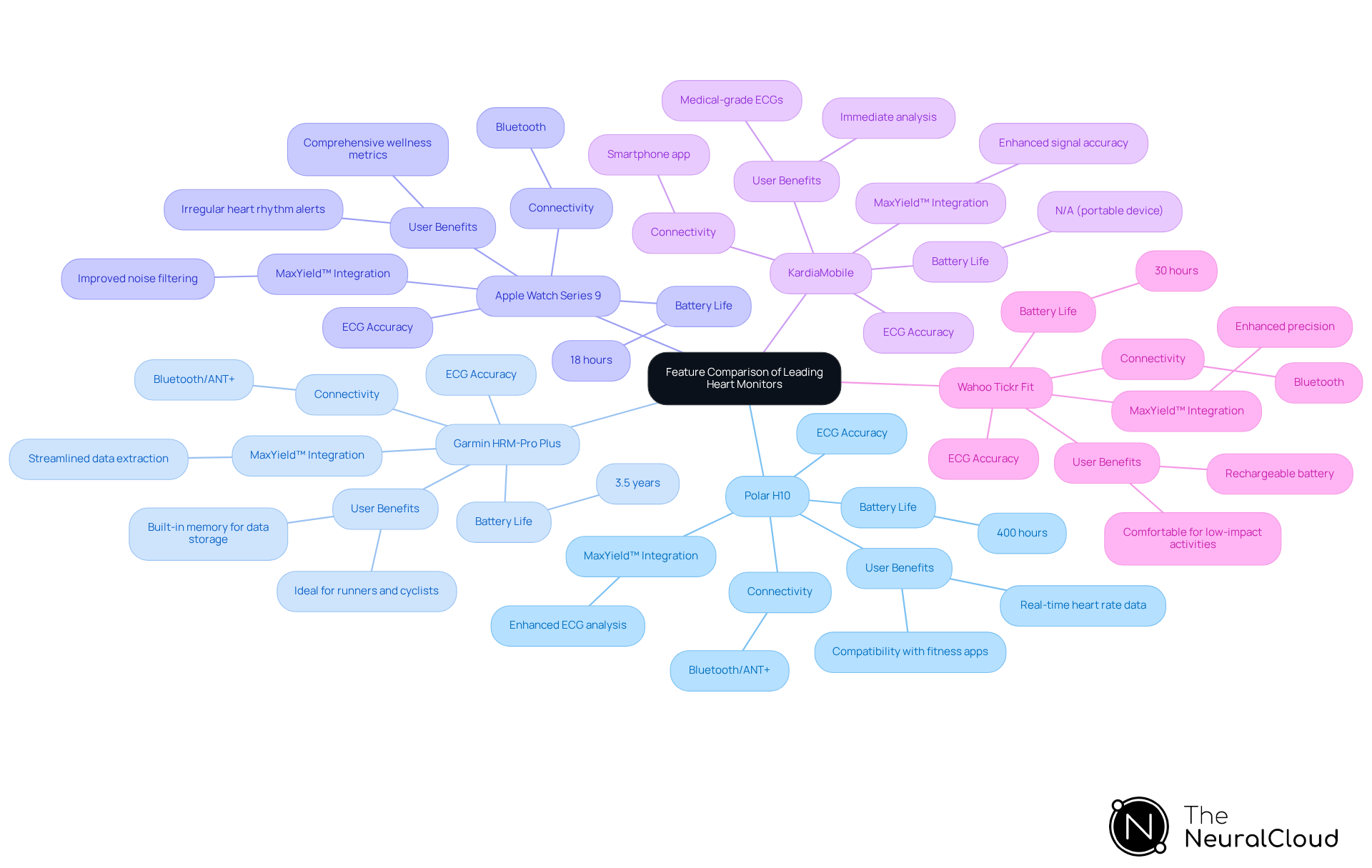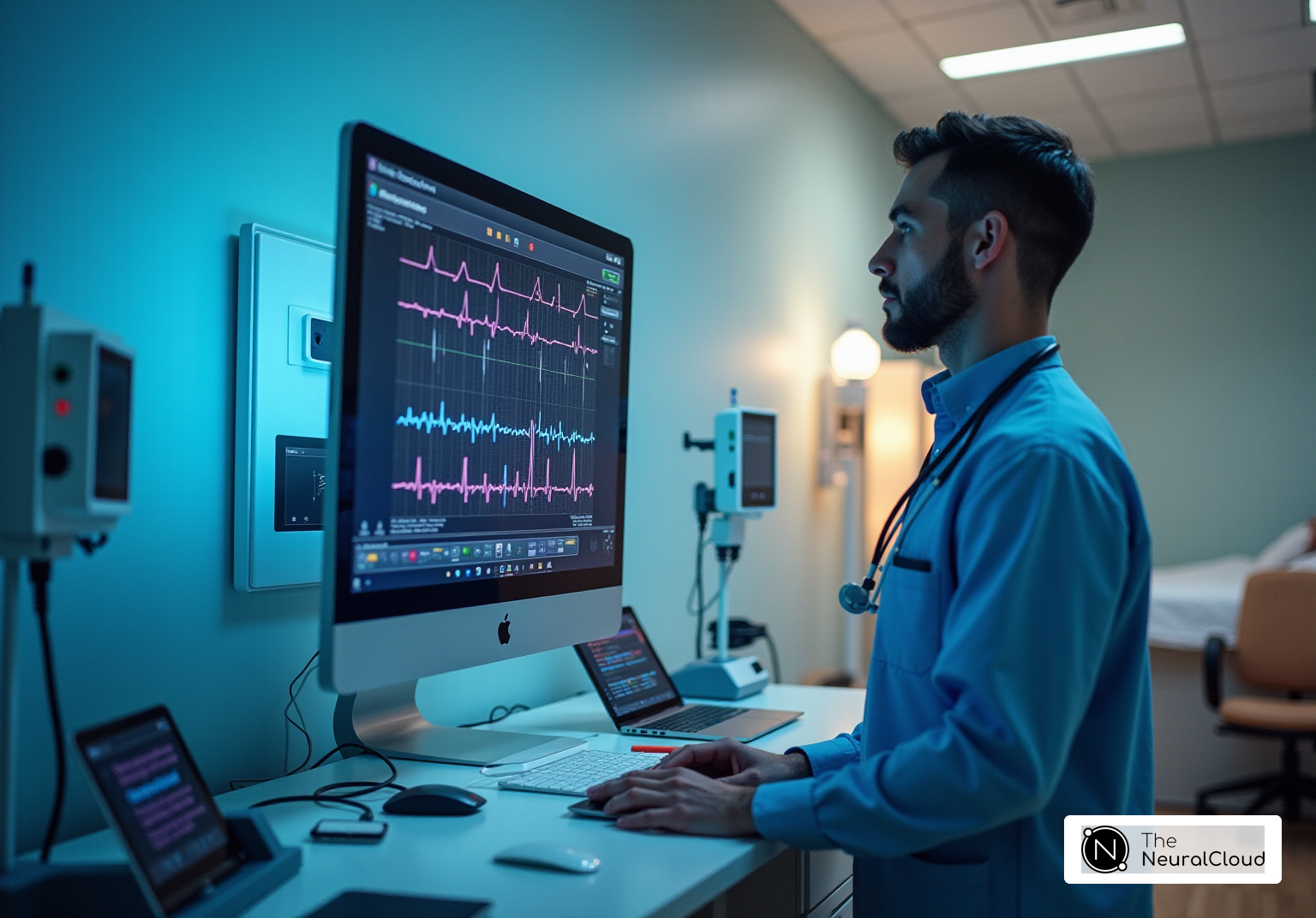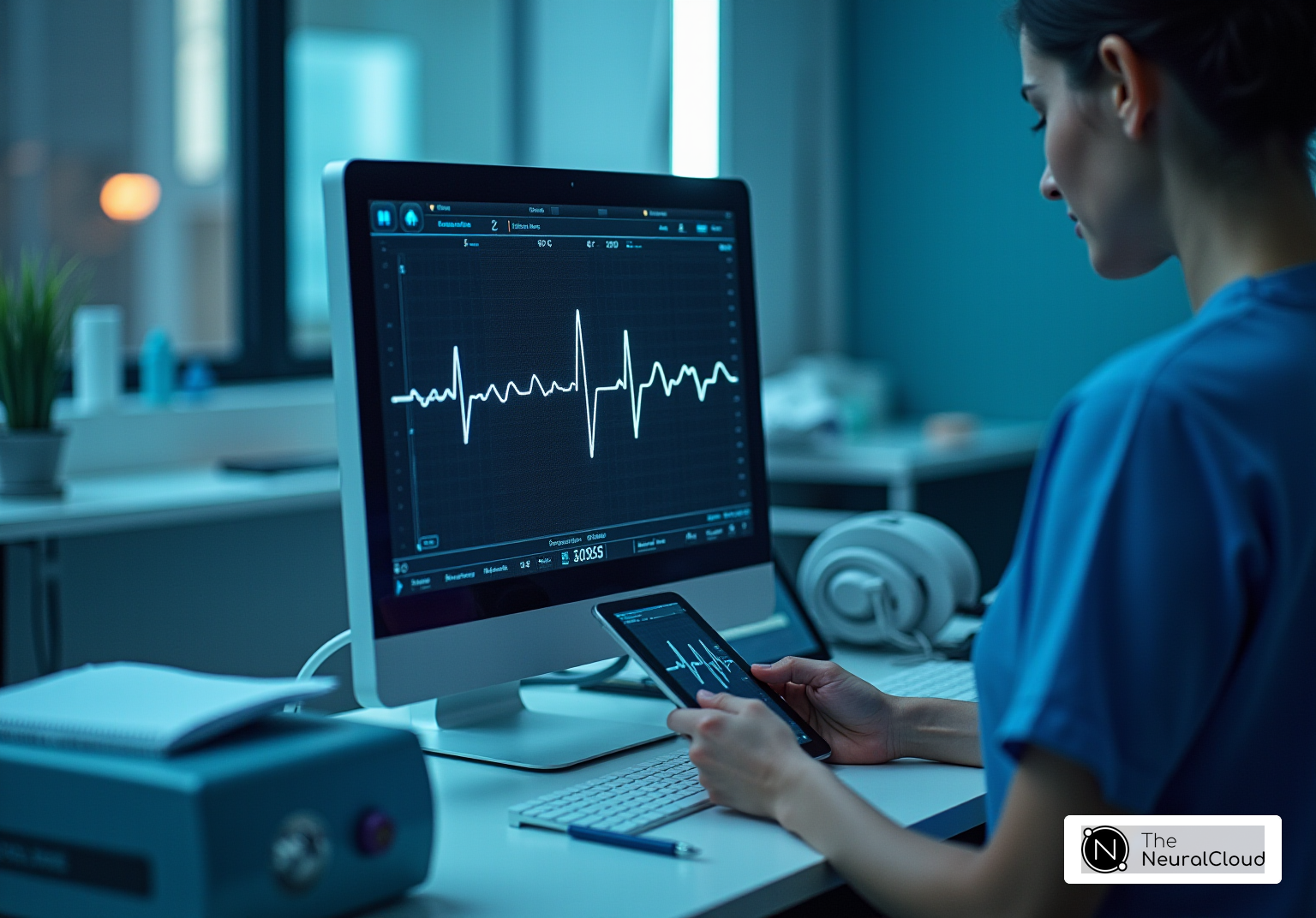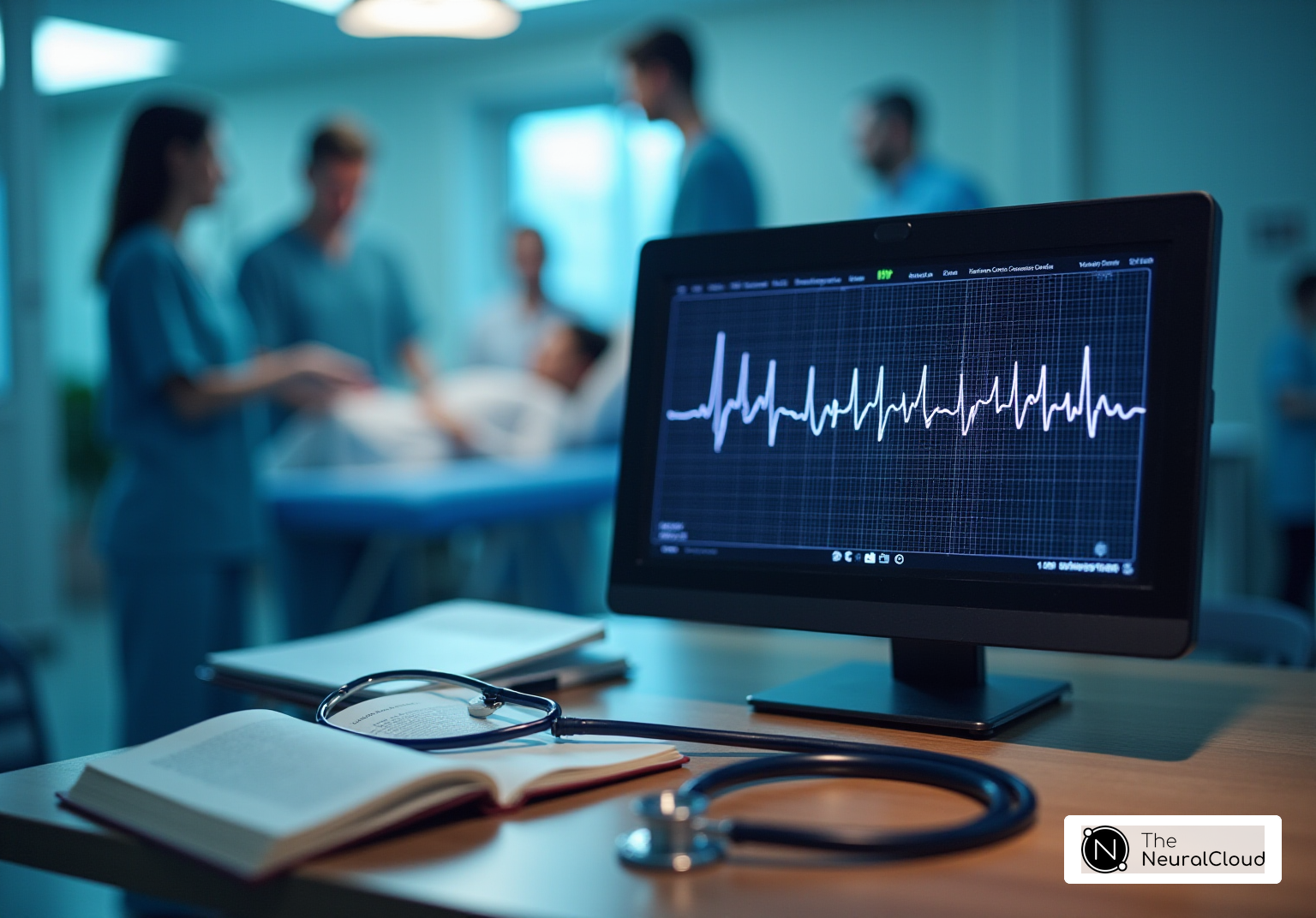Overview
The article provides a comparative analysis of four personal heart monitors:
- Polar H10
- Garmin HRM-Pro Plus
- Apple Watch Series 9
- KardiaMobile
It highlights their features, advantages, and suitability for different user needs. Each monitor is evaluated based on:
- Accuracy
- User-friendliness
- Specific health monitoring capabilities
Furthermore, it demonstrates how advanced technologies, such as MaxYield™, enhance performance and effectiveness in health management. This comprehensive overview assists healthcare professionals and consumers alike in making informed decisions regarding heart monitoring technology.
Introduction
Personal heart monitors have become essential tools for individuals aiming to take control of their cardiovascular health, combining advanced technology with user-friendly designs. As the market for wearable medical devices continues to grow, consumers are faced with numerous options, ranging from advanced ECG monitors to multifunctional smartwatches. However, this variety presents a challenge: selecting the right device that aligns with specific health needs and lifestyles. Which personal heart monitor excels in terms of features, advantages, and overall suitability for a diverse user base?
Overview of Personal Heart Monitors
Personal heart monitors have surged in popularity as essential tools for tracking cardiovascular health and fitness. These devices range from basic wrist-worn fitness trackers to advanced chest straps and portable ECG monitors. Utilizing technologies such as photoplethysmography (PPG) and electrocardiogram (ECG) methods, they deliver real-time heart rate data, empowering users to take charge of their health. The global wearable medical equipment market, valued at approximately USD 42.7 billion in 2024, is projected to reach USD 54.0 billion in 2025, reflecting the increasing demand for these innovative solutions.
The growth of wearable technology has enabled proactive health management and early detection of potential cardiovascular issues. For instance, wearable ECG devices can continuously monitor cardiac rhythms, significantly improving the detection of conditions like atrial fibrillation (AFib), which affects 1 in 4 individuals over 40 during their lifetime. Advanced platforms such as Neural Cloud Solutions' MaxYield™ enhance this capability by employing sophisticated algorithms that automate ECG signal labeling and analysis. MaxYield™ stands out for its precise wave definition and noise filtering, ensuring accurate readings even in challenging conditions, which is vital for effective monitoring.
As the market progresses, personal heart monitors are incorporating advanced features like arrhythmia detection and seamless connectivity with mobile applications, thereby enhancing their utility for both fitness enthusiasts and patients with heart conditions. MaxYield™'s ability to filter noise and identify distinct ECG waveforms allows for the recovery of previously obscured data, boosting the reliability of these tools.
Real-world examples illustrate the effectiveness of these devices. Sarah, a 68-year-old patient, shares her positive experience with a user-friendly smartwatch that allows her to track her pulse rate and blood pressure effortlessly. Similarly, John, a 75-year-old user, emphasizes the importance of user-friendliness in his remote monitoring tool, which connects to his phone and sends notifications, making wellness checks feel routine. These testimonials highlight how personal heart monitors not only provide crucial health insights but also foster healthier habits and greater patient engagement.
However, it is essential to acknowledge the limitations of wearable technology. For example, heart rate data may be less reliable during arrhythmias or intense physical activity, which can impact the accuracy of readings. Moreover, the integration of artificial intelligence in wearable technology is a significant trend that enhances the functionalities of these devices, enabling superior analysis and predictive insights. Expert opinions, including those from Dr. Shapiro, indicate that wearables can identify AFib more frequently than traditional medical devices, underscoring their potential to prevent serious medical issues like strokes. Overall, while personal monitors offer numerous advantages, understanding their limitations is crucial for users seeking to improve their cardiovascular health monitoring.

Feature Comparison of Leading Heart Monitors
In 2025, the leading personal heart monitors include the Polar H10, Garmin HRM-Pro Plus, Apple Watch Series 9, KardiaMobile, and Wahoo Tickr Fit, each distinguished by unique features tailored to various user needs:
-
Polar H10: Renowned for its ECG accuracy, the Polar H10 delivers real-time heart rate data and boasts an impressive battery life of up to 400 hours. Its compatibility with a wide range of fitness apps enhances its versatility, making it a top choice for serious athletes. When paired with Neural Cloud Solutions' MaxYield™, the Polar H10 can further enhance its ECG analysis capabilities, ensuring cleaner signals and more accurate readings by effectively filtering out noise and artifacts.
-
Garmin HRM-Pro Plus: This chest strap monitor stands out for its precision in tracking heart rate during workouts. It supports both ANT+ and Bluetooth connectivity, enabling smooth integration with a range of gadgets. Additionally, it features built-in memory, enabling users to store data during activities without needing a connected device, which is particularly beneficial for runners and cyclists. The integration of MaxYield™ can streamline data extraction and labeling, reducing operational costs and enhancing overall efficiency by automating the analysis process.
-
Apple Watch Series 9: Merging fitness tracking with sophisticated wellness monitoring, the Apple Watch Series 9 includes a personal heart monitor along with ECG capabilities and irregular heart rhythm alerts. This smartwatch is perfect for fitness lovers and those requiring a personal heart monitor, providing a complete range of wellness metrics. With MaxYield™, users can expect improved noise filtering and wave recognition, leading to more reliable ECG readings and better management of physiological variability.
-
KardiaMobile: As a portable ECG unit, KardiaMobile acts as a personal heart monitor, empowering users to conduct medical-grade ECGs anytime, anywhere. It offers immediate analysis and enables users to share outcomes with healthcare professionals, making the personal heart monitor a valuable resource for proactive cardiovascular health management. The MaxYield™ platform can enhance KardiaMobile's capabilities by addressing physiological variability and signal artifacts, ensuring accurate readings even in challenging conditions.
-
Wahoo Tickr Fit: This personal heart monitor is recognized for its comfort, featuring a rechargeable battery that lasts up to 30 hours and is priced between $89 and $100. It is particularly suitable for low-impact activities and offers seamless connectivity with various fitness apps. Incorporating MaxYield™ can enhance the precision and dependability of the information gathered by this equipment, guaranteeing that users obtain the most exact monitoring possible.
This comparison highlights the variety in features among these products, catering to different user preferences and needs. User reviews highlight the Polar H10's accuracy and comfort, while the Garmin HRM-Pro Plus is praised for its reliability during intense workouts. The Apple Watch Series 9 is noted for its multifunctionality, and KardiaMobile is recognized for its convenience in obtaining quick ECG readings. Additionally, expert insights emphasize the Garmin HRM-Pro Plus's performance, reinforcing its position as a top choice among heart monitors. By leveraging the advanced capabilities of MaxYield™, these tools can significantly enhance ECG analysis efficiency and accuracy.

Benefits and Drawbacks of Each Heart Monitor
Polar H10:
- Benefits: Renowned for its ECG-level accuracy, the Polar H10 offers a comfortable fit, impressive battery life of up to 400 hours, and compatibility with over 200 fitness apps. This makes it ideal for serious athletes. Its integration with advanced technologies like Neural Cloud Solutions' MaxYield™ can further enhance ECG analysis efficiency, providing automated labeling that saves time and reduces operational costs.
- Drawbacks: The necessity of a chest strap may deter casual users seeking convenience. This requirement could limit the product's appeal for those looking for a more user-friendly option that seamlessly integrates with MaxYield™.
Garmin HRM-Pro Plus:
- Benefits: This monitor excels in accuracy during intense workouts, features dual connectivity options, and includes built-in memory for offline data storage. These attributes make it a favorite among dedicated athletes. The potential for integration with MaxYield™ technology can also streamline data processing, enhancing workflow efficiency.
- Drawbacks: Its higher price point compared to basic models may be excessive for casual users. Some fitness experts note that it may offer more features than necessary for those not deeply integrated into the Garmin ecosystem, which could complicate its integration with MaxYield™.
Apple Watch Series 9:
- Benefits: As a multifunctional device, it combines fitness tracking, ECG capabilities, and health notifications. This appeals to users who value versatility in their wearables. Integrating with MaxYield™ could enhance its ECG analysis capabilities, addressing challenges like physiological variability and signal artifacts.
- Drawbacks: The extensive features can result in reduced battery life. Although it offers pulse rate data, it may not align with the precision of specialized monitors for specific metrics, with an error rate of 2.0% and an overall accuracy of about 91%. This could impact its effectiveness when used with MaxYield™ for precise ECG analysis.
KardiaMobile:
- Benefits: This device delivers medical-grade ECG readings, is user-friendly, and allows for easy sharing of results with healthcare providers. This makes it a valuable tool for using a personal heart monitor to monitor heart conditions. Its compatibility with MaxYield™ can further enhance the accuracy and reliability of ECG data analysis.
- Drawbacks: Its functionality is restricted to ECG monitoring, lacking continuous heart rate tracking features available in other equipment. Furthermore, it serves mainly as a preventive instrument rather than a constant monitoring system, which may restrict its effectiveness when combined with MaxYield™ for ongoing analysis.
This analysis provides users with insights to determine which personal heart monitor best meets their wellness monitoring needs, while also highlighting the transformative potential of incorporating advanced technologies like MaxYield™.

Suitability and Recommendations for Users
When selecting a personal heart monitor, it is essential to align the choice with individual needs and health objectives:
-
For Fitness Enthusiasts: The Polar H10 and Garmin HRM-Pro Plus are distinguished for their precision during workouts, delivering detailed heart rate data that is crucial for optimizing training performance. Chest strap monitors like the Polar H10 are recognized for their accuracy, particularly during high-intensity activities. Meanwhile, the Garmin HRM-Pro Plus offers advanced metrics, including running dynamics and heart rate variability.
-
For General Wellness Monitoring: The Apple Watch Series 9 serves as an outstanding choice for users seeking a versatile gadget that not only tracks fitness but also provides extensive wellness insights, including ECG capabilities. Its user-friendly interface and integration with wellness applications make it a popular option among those aiming to maintain overall well-being.
-
For Medical Monitoring: The KardiaMobile is highly recommended as a personal heart monitor for individuals needing to closely track their cardiovascular condition, especially those with pre-existing issues. This device delivers reliable ECG readings that can be easily shared with healthcare professionals, facilitating proactive management of heart-related concerns.
Ultimately, the ideal heart monitor depends on the user's lifestyle, wellness objectives, and whether they prioritize advanced features or straightforward monitoring. With nearly 70% of consumers expressing a willingness to engage in remote patient monitoring programs, selecting the right device can significantly enhance health management and awareness.

Conclusion
Personal heart monitors have become essential tools for individuals aiming to take control of their cardiovascular health. A diverse array of options is available, ranging from advanced ECG monitors to user-friendly smartwatches, catering to various user needs and preferences. The integration of cutting-edge technologies like Neural Cloud Solutions' MaxYield™ enhances their functionality, ensuring accurate and reliable heart rate monitoring.
This article explored key features and benefits of leading heart monitors, including the following:
- Polar H10
- Garmin HRM-Pro Plus
- Apple Watch Series 9
- KardiaMobile
- Wahoo Tickr Fit
Each device offers unique advantages tailored to specific user groups, whether for fitness enthusiasts, general wellness monitoring, or medical oversight. The insights provided underscore the importance of selecting a heart monitor that aligns with individual health objectives while acknowledging the limitations inherent in wearable technology.
As personal heart monitors continue to evolve, they present an opportunity for users to engage actively in their health management. By choosing the right device, individuals can enhance their fitness and wellness journeys while contributing to early detection and prevention of potential cardiovascular issues. Embracing these technologies empowers users to make informed decisions about their health, fostering a proactive approach to cardiovascular wellness.
Frequently Asked Questions
What are personal heart monitors?
Personal heart monitors are devices used to track cardiovascular health and fitness, ranging from basic wrist-worn fitness trackers to advanced chest straps and portable ECG monitors.
How do personal heart monitors work?
They utilize technologies such as photoplethysmography (PPG) and electrocardiogram (ECG) methods to deliver real-time heart rate data, allowing users to monitor their health.
What is the projected growth of the wearable medical equipment market?
The global wearable medical equipment market is projected to grow from approximately USD 42.7 billion in 2024 to USD 54.0 billion in 2025, indicating increasing demand for these devices.
What health issues can personal heart monitors help detect?
They can help in the early detection of cardiovascular issues, such as atrial fibrillation (AFib), which affects 1 in 4 individuals over 40 during their lifetime.
What advanced features do personal heart monitors offer?
They incorporate features like arrhythmia detection and seamless connectivity with mobile applications to enhance their utility for both fitness enthusiasts and patients with heart conditions.
How does Neural Cloud Solutions' MaxYield™ improve heart monitoring?
MaxYield™ uses sophisticated algorithms for ECG signal labeling and analysis, providing precise wave definition and noise filtering for accurate readings, even in challenging conditions.
Can you provide examples of user experiences with personal heart monitors?
Sarah, a 68-year-old patient, appreciates her user-friendly smartwatch for tracking pulse rate and blood pressure. John, a 75-year-old user, values his remote monitoring tool that connects to his phone and sends notifications, making wellness checks routine.
What are the limitations of personal heart monitors?
Heart rate data may be less reliable during arrhythmias or intense physical activity, potentially impacting the accuracy of readings.
How does artificial intelligence enhance wearable technology?
The integration of artificial intelligence in wearable technology enhances functionalities, enabling superior analysis and predictive insights, improving the identification of conditions like AFib.
What do experts say about the effectiveness of wearable heart monitors?
Experts, including Dr. Shapiro, indicate that wearables can identify AFib more frequently than traditional medical devices, highlighting their potential to prevent serious medical issues like strokes.






